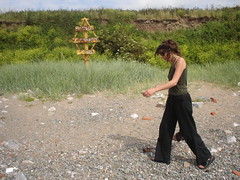The poet, in taking this journey, attempts to capture something of what it is to exist, holds it up so that we, the reader, can understand ourselves, and them, a little better. In many ways, the poem attempts to hold what we cannot hold – the transient miracle of life. Our lives.
The exploration and the fun is in finding ways of creating poems that move beyond the A+B+C building blocks of functional language and begin to inhabit this ‘small space of miracles’.
It is important to delve deeper than the construction of the word-poem and consider in our composition the sound and breath held in a word, the rhythms, the music, the beat, the dance, the movement, the shape. It is about loosening the connection between word and meaning, allowing the air back in. Allowing the breath back in.
The poem, in its essence, communicates something of the experience of its composer. It is the unique expression of that individual, or the shared song of a community. It captures not the mighty (though it can) but celebrates the ordinary miracle. Joseph Brodsky, a poet and activist, said that “poetry is essentially the soul’s search for its release in language”.
In a world where language is increasingly about control, power, access, function and manipulation, poetry
“encourages us to revisit our language, to experience it anew, to come to understand it as a means of communication, deep connection and understanding between ourselves and others, and between the different aspects of ourselves”
(Staying Alive, pg 24 Astley, N).
This is the value of poetry. This is why I choose to share my poetry with others, because in my own life, it has enabled me to live through challenges, learn through experience, understand myself, the world, and others better and, when I had no voice, to communicate to others the existence of my unique being in this wide, wide world; my unique gift.
And every person has a gift to offer the world. Poetry, like all the creative arts, helps us to listen to our hearts, to find that gift and to share it. And that is the right of every human being, and I hope that in some ways, my presence within Beaumont contributes to that exploration.
I would like to finish today with a line from the poet, Denise Levertov, that inspired me, taken from her poem Variations of a Theme by Rilke;
“...what I heard was my whole self
saying and singing what I know: I can.”
saying and singing what I know: I can.”


2 comments:
Poetry is so much more than mere words on a page. It is a process of the life force isn't it.
Introduction to Poetry (Billy Collins)
I ask them to take a poem
and hold it up to the light
like a color slide
or press an ear against its hive.
I say drop a mouse into a poem
and watch him probe his way out,
or walk inside the poem's room
and feel the walls for a light switch.
I want them to waterski
across the surface of a poem
waving at the author's name on the shore.
But all they want to do
is tie the poem to a chair with rope
and torture a confession out of it.
They begin beating it with a hose
to find out what it really means.
Post a Comment